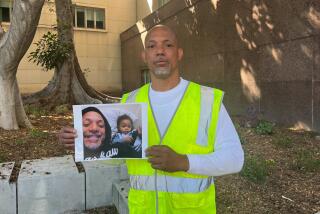Lawyer Cites Problems of Dead Baby’s Mother : Courts: He says Pamela Rother, accused of killing child, was clearly delusional. Officials respond to criticism of handling of case.
An Ojai Valley woman accused of starving her infant daughter to death was obviously delusional and lacked a “real firm grasp on reality” when she was interviewed by medical and welfare officials weeks after giving birth, her attorney said Thursday.
“What I’m finding out is she really was not in very good shape from the very beginning,” said Douglas W. Daily, the attorney for Pamela Rother, whose 2-month-old daughter died last week.
“She was experiencing a lot of things that were so removed from reality that even a lay person would be very concerned,” the deputy public defender said. “Even putting the best possible interpretation on it, one would have to conclude she was having a lot of problems.”
*
Daily’s comments, which he said were based on reports from a Jan. 12 evaluation of Rother and her then 3-week-old daughter, came as county officials responded to criticism of their handling of the case. Rother was charged this week with murder and felony child endangering.
“A lot of second guessing’s going to go on, a lot of Monday morning quarterbacking, but you’ve got to deal with the facts at the time,” said James E. Isom, director of the Public Social Services Agency. “I think what we did was correct, given the circumstances.”
“I don’t know what we could have done differently to have prevented this unfortunate incident,” he said during a press conference in Ventura.
But Isom acknowledged that under-funding and the passage of laws that favor keeping children with their natural parents have created flaws in the system. “There are problems with it,” he said. “There are holes in it.”
*
Isom said social workers never visited the 31-year-old mother’s small silver trailer on a hillside north of Ojai, because there were no obvious signs of abuse during the Jan. 12 evaluation and because heavy caseloads severely limit workers’ time.
And despite two anonymous reports that Rother suffered serious mental problems, she was not given a psychological evaluation Jan. 12. Isom said such exams are typically ordered by a court. Social workers do not have the authority or the training to make psychological appraisals, he said.
Messy living conditions and allegations of drug use are not enough, he said, for social workers to remove a child from a home. Last year, the county’s 16 child welfare workers fielded 6,444 reports of neglect or abuse, half of which were investigated in person.
*
In Rother’s case, two neighbors called a county hot line for child abuse within weeks of the birth of Rachael Catherine Rother. The neighbors said they were concerned about Rother’s alleged drug abuse and erratic behavior, Isom said.
The first of those anonymous calls was logged Jan. 5 by social workers and reported to the Sheriff’s Department. The information was not considered serious enough to trigger an emergency response. Isom said he did not know if any action was taken.
The second call, on Jan. 12, led sheriff’s deputies to break down Rother’s door and take the woman’s baby for an evaluation by a doctor at Ojai Valley Hospital and a child protective services worker. Isom said the baby appeared healthy though at the low end of the normal weight range. The infant was returned to Rother later that day after authorities concluded there were no signs of abuse and no legal basis for keeping her.
Daily said he is trying to learn more about Rother’s mental state when she was brought to Ojai Valley Hospital shortly after giving birth Dec. 21.
“It’s my understanding that many of the medical personnel were very concerned with her,” he said.
Unfortunately, experts say, the circumstances surrounding Rachael’s death are not that uncommon.
*
An estimated 500 to 700 children are killed by their mothers each year, said Richard J. Gelles, director of the Family Violence Research Program at the University of Rhode Island.
In 30% to 50% of infanticide cases, child welfare workers have had contact with the infants who are killed, he said.
The system often fails such children, he said, because of “too many cases, bad training and poor risk assessment.”
Pamela Rother, whom investigators and neighbors have described her as a suspected drug user, would seem to fit the characteristics of a neglectful mother, Gelles said.
“You oftentimes find the mom is depressed. . . . You’re going to find drug and psychiatric problems,” he said.
“Depression is the thing that’s driving the other symptoms,” Gelles said. “She’s not buying food, she’s not getting out of bed, she’s not attending to the baby’s crying.”
More to Read
Sign up for Essential California
The most important California stories and recommendations in your inbox every morning.
You may occasionally receive promotional content from the Los Angeles Times.









